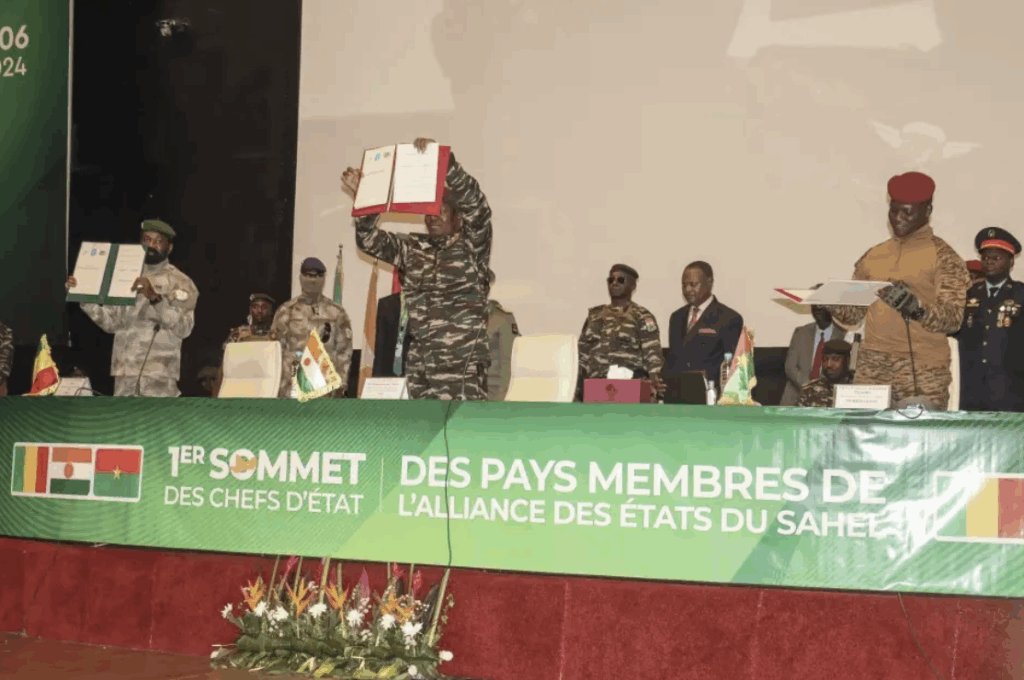Written by: Zoe Leousis
Edited by: Ellie Litvack
Motivations and Implications of West African Countries Withdrawing from the ICC

The leaders of Niger, Gen. Abdourahamane Tiani (C), Mali, Col. Assimi Goita (L), and Burkina Faso, Capt. Ibrahim Traore (R), show the documents of the Confederation of Sahel States, which they signed during their first summit in Niamey, Niger, July 6, 2024. © 2024 Photo by -/AFP via Getty Images
When the International Criminal Court (ICC) was founded in 2002, it sparked new hope that international law had finally developed a reliable method for global human rights enforcement. Over 60 countries ratified the Rome Statute, granting this “court of last resort” the jurisdiction to hold persons accountable for the most serious crimes of concern, such as genocide, war crimes, and crimes against humanity. The ICC was intended to serve as a complement to national courts, stepping in only when countries were unwilling to prosecute perpetrators of major crimes. Focusing on holding individuals, not states, accountable for large-scale atrocities, the ICC can only exercise jurisdiction over crimes if they were “committed on the territory of a State party to the Rome Statute, or a state that has accepted the ICC’s jurisdiction, or by one of its nationals.”
Today, even though 120 countries are treaty-bound to the ICC, opinions on the court’s success are debatable. Out of the thousands of cases that have been considered since its establishment, only 31 have been tried before the ICC, leading to only 10 convictions and 4 acquittals. These convictions result in imprisonment within an ICC detention center for 30 years to life, and international condemnation. The majority of these cases are still ongoing, either because the accused are not in custody, or because there are inter-state disputes involving political interference or witness tampering.
A significant number of African countries are presently among the ICC’s most vocal critics. Out of 31 cases launched since its inception, only one involved a country other than Africa, resulting in widespread accusations of racism and calls for the mass withdrawal of African stakeholders. Recently, in an unprecedented albeit anticipated political move, Burkina Faso, Mali, and Niger have announced their plans to withdraw from the jurisdiction of the ICC, citing the court’s inability to ‘properly handle and prosecute proven war crimes.’ This move comes after the three countries withdrew from the Economic Community of West African States (ECOWAS) earlier this year.
Critics of these three countries claim they are committing a disservice to the broader application of international justice. Through their withdrawal, they undermine the authority of the ICC and potentially embolden those who seek to commit atrocities in the region. Burkina Faso, Mali, and Niger are all presently controlled by military junta forces, which have increasingly faced accusations of crimes against civilians which, if brought before the ICC, could result in convictions.
While these criticisms are grounded in a general faith towards the integrity of international policing, they overlook deeper frustrations that have driven African countries to protest the ICC’s authority. Aside from beliefs of the court’s impartiality due to its investigations often targeting less privileged countries, the West African states seek a withdrawal in the hopes of instead creating ‘indigenous mechanisms for the consolidation of peace and justice.’ These mechanisms refer to justice systems rooted in regional governance structures removed from post-colonial influences, intended to better represent the interests of African states. Rather than acceding to what the leaders of Burkina Faso, Mali, and Niger regard as ‘an instrument of neocolonial repression in the hands of imperialism,’ these countries are attempting to remove themselves as signatories to international legal obligations in order to reclaim judicial autonomy.
This decision sheds light on an increasingly complex problem in the sphere of international relations. There is a continuous tension between countries’ desire to uphold their sovereignty and the collective global efforts to protect universal human rights through international institutions such as the ICC. Countries with a history of foreign intervention or colonization continue to distance themselves from dominating enforcement mechanisms, viewing them as biased instruments which rarely hold powerful states accountable. Without acknowledging these disparities among nations, the legitimacy of the ICC will continue to be challenged, and its status as an international institution will continue to wither.
